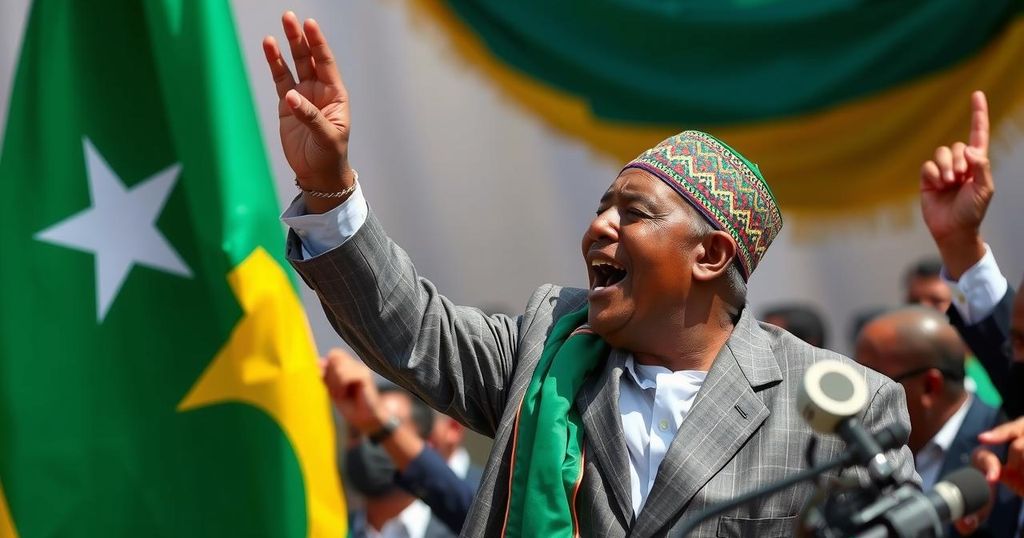Abdirahman Mohamed Abdullahi ‘Irro’ Declared President of Somaliland After Election Victory
Abdirahman Mohamed Abdullahi ‘Irro’ has won the presidential elections in Somaliland with 64% of the vote, becoming the sixth president of the self-declared republic. His victory comes against incumbent Musa Abdi Bihi, who received 35% of the votes. Irro’s leadership is expected to address significant economic challenges and navigate complex diplomatic relations, particularly concerning an agreement with Ethiopia. Despite stability, Somaliland still lacks international recognition, which remains a pivotal issue for its future.
Abdirahman Mohamed Abdullahi, commonly referred to as Irro, has emerged victorious in the recent presidential elections of Somaliland, receiving an impressive 64% of the popular vote. This election, held on November 13, marks a significant political shift as Irro becomes the sixth president of Somaliland since its declaration of independence from Somalia in 1991. In a contest against the incumbent president, Musa Abdi Bihi, who garnered 35% of the vote, Irro’s victory signals a demand for change in leadership amid pressing economic challenges and public discontent towards Bihi’s administration, which had been criticized for its paternalistic approach. The election was closely monitored by diplomats from nine European nations and the United States, highlighting the international interest in this self-declared republic that, while maintaining relative stability and regular democratic elections, has yet to gain global recognition. Somaliland has experienced significant turmoil in its history, having declared independence during the civil war in 1991. Since then, it has rebuilt its institutions and economy, establishing a stark contrast to Somalia, which has faced decades of unrest and challenges, including threats from militant groups. The newly elected president will not only need to address economic issues exacerbated by a declining local currency but also navigate complex diplomatic challenges, particularly regarding a controversial agreement to lease a segment of its coastline to Ethiopia for the establishment of a naval base. This deal has drawn criticism from Somalia, which believes that Somaliland remains part of its territory and perceives this agreement as hostile. Abdirahman Irro, who holds a master’s degree in business administration from a university in the United States, previously served as the speaker of Somaliland’s parliament. Since entering politics in 2002 as a co-founder of the Justice and Welfare party (UCID) and subsequently establishing the Wadani Party, Irro has gained considerable influence in Somaliland’s political landscape. His leadership is viewed as a beacon of hope for many who seek to further the region’s autonomy and economic development. This election underscores the resilience of Somaliland’s democratic processes amidst regional instability, emphasizing the population’s determination to pursue self-governance and international recognition.
Somaliland, a self-declared republic geographically located in the Horn of Africa, declared independence from Somalia in 1991 amid civil strife. While it operates independently and has maintained relative peace, it remains unrecognized internationally, leading to a complex socio-political landscape. The recent elections held on November 13, 2024, showcased the democratic ideals of Somaliland, where citizens as young as 15 participate in voting. The region’s former ties with Somalia complicate its quest for recognition, further exacerbated by current economic struggles and contentious diplomatic agreements, notably one involving Ethiopia. Historical conflict and the successful rebuilding of societal structures following the civil war provide a backdrop for understanding Somaliland’s current political dynamics.
Abdirahman Mohamed Abdullahi’s election as president of Somaliland serves as a pivotal moment in the region’s quest for self-governance and international recognition. His victory indicates a shift in public sentiment towards leadership that is responsive to the citizens’ needs amid economic difficulties. The challenges facing his administration—ranging from domestic economic recovery to diplomatic tensions with Somalia—will be critical in determining the future stability and recognition of Somaliland as a sovereign entity. Overall, the resilience of Somaliland’s democratic system continues to inspire hope amid regional complexities.
Original Source: www.bbc.com




Post Comment